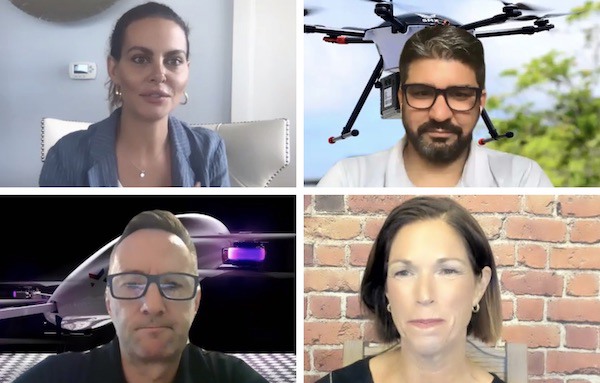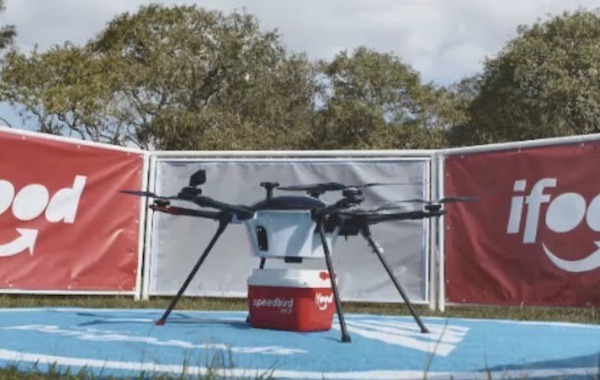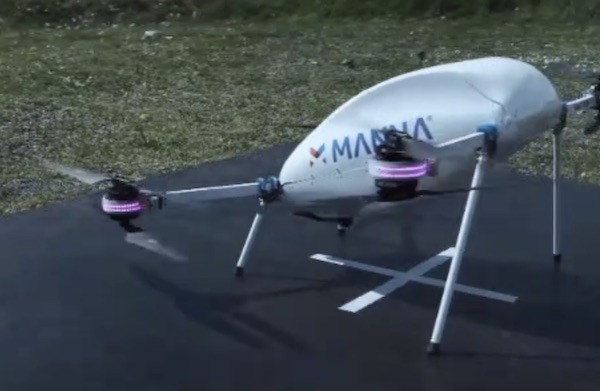This week’s PMA virtual town hall focused on the ‘last mile delivery’ – the last step in the supply chain, which is often considered to be most crucial and problematic. As the pandemic hit, distributing produce directly to consumers became more popular but the challenge of actually delivering the products, in a timely and safe manner, grew. This week’s virtual town hall was moderated by Vonnie Estes, PMA's VP of Technology and the panel featured Ashley Tyrner, CEO and Founder of Farmbox Direct, Manoel R. Coelho, CEO of Speedbird Aero, and Bobby Healy, CEO of Manna, who discussed different solutions for efficient direct-to-consumer delivery.

Top: Tyrner and Coelho. Bottom: Healy and Estes.
Combining reefer trucks and UPS
Ashley Tyrner founded Farmbox Direct with the purpose of providing fresh produce to Americans living in food deserts. When the pandemic hit, the need for fresh produce and the company grew exponentially. “We deliver boxes filled with produce directly to consumers in 49 states. When the pandemic began, we grew overnight, and we’re very fortunate that we were able to scale up our operations to continue to feed America. We have definitely seen a shift in the consumer base: the people who are at a higher risk, such as elderly people, are now more likely to order their produce online because they are staying at home more.”
When the pandemic broke out, Farmbox Direct wasn’t the only business who grew overnight. Tyrner explains: “Our biggest challenge was the delay in delivery. UPS was suddenly faced with peak surges that no one could have prepared for. Fresh produce boxes can’t handle a delay in delivery, so we had to make changes on our end to improve the delivery times. We have started using refrigerated trucks that will transport the boxes to UPS hubs closer to the final destination. Unfortunately, this does increase the overall costs by about 10%, but it allows us to ensure a timely delivery of fresh products.”
Drones in Brazil’s urban landscape
A new and innovative solution that is emerging is delivering products using drones. This technology is not used much in the United States due to strict regulations, but two of the panelists, located in Brazil and Ireland, discuss how their companies are using drones to increase delivery efficiency. “We are the first drone delivery company in Latin America,” says Manoel Coelho, CEO of Speedbird Aero. The company works in a multi-modal manner and connects strategic points in the city that enable the delivery staff to make three to four more deliveries per hour. “The drones deliver the products to a strategic location in the city, from which the delivery staff picks it up and then proceeds to deliver it,” Coelho explains.

Working in a city like São Paulo, Brazil, great care needs to be taken to ensure that the project doesn’t endanger the safety of the people in the city. “The project is officially launching today, and we have been working very closely with the authorities to ensure that it will be very safe. Brazil is well known for their aviation regulations, so the regulators are used to dealing with this type of technology. We are currently working on proving the safety and reliability of this technology and then we will have to ensure that we can safely coexist with the other air traffic in the city. Our software allows us to share the tracking of the drones so that the safety can be ensured,” explains Coelho. The drones will be used to deliver food orders to consumers in the city.
Autonomous drone deliveries in Ireland
Bobby Healy is the CEO of Manna and his company has executed just shy of 20,000 drone deliveries in Ireland since March. As of yesterday, the company also announced a partnership with Tesco. “Our drones are fully autonomous aircraft that deliver products directly to the consumers at 80 km per hour. Our maximum delivery time is 3 minutes from the shop to the consumer’s home. The drone will actually hover above the house and when the consumer confirms the delivery the aircraft will lower down the order. We will be working with around 950 different items from Tesco for the deliveries.”

One of the biggest consumer concerns with regard to drone deliveries is noise. “Our drones have specially designed propellers, and while they make some sound, it’s a sound that is not audible from the ground when it is up in the air. When the drone lowers down to deliver the product, you can hear it, but the sound doesn’t travel through windows, so neighbors won’t be disturbed,” Healy explains. The company is currently also delivering COVID-19 test kits and medicines and hope to be able to also pick up completed test kits from consumers in the future.
Next week’s virtual town hall will focus on the costs of compliance in the age of the pandemic. As many businesses have made additional investments during the pandemic, this town hall will examine the costs and returns of these investments.
